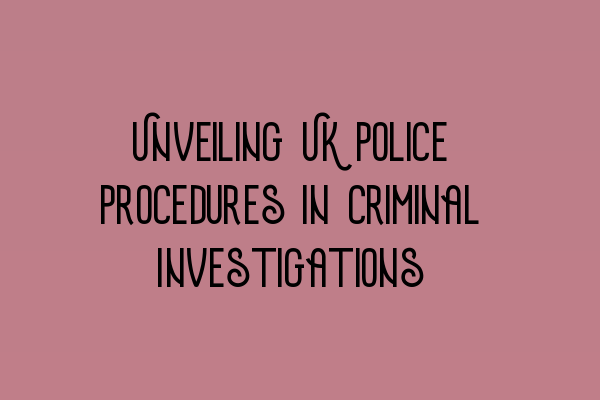Unveiling UK Police Procedures in Criminal Investigations
Welcome to the SQE Criminal Law & Practice Law UK blog. In this article, we will take an in-depth look at the intricate procedures followed by the UK police during criminal investigations. It is crucial for aspiring solicitors and legal professionals to have a thorough understanding of these procedures, as they play a significant role in the overall criminal justice system.
Before delving into the specifics, let’s first understand the importance of proper police procedures. The UK police are responsible for upholding law and order, protecting citizens, and ensuring the fair administration of justice. To achieve these goals, the police must adhere to strict protocols and guidelines when conducting criminal investigations.
One of the key aspects of UK police procedures is the gathering of evidence. From the moment a crime is reported, the police initiate a systematic process of collecting and preserving evidence. This evidence can include physical items, witness statements, CCTV footage, and digital records. The meticulous collection of evidence is vital in establishing the facts of a case and ensuring a fair trial.
During the investigation, the police may also employ various investigative techniques to gather additional information and uncover leads. These techniques can include conducting interviews, executing search warrants, surveillance, and collaborating with forensic experts. Each technique is carefully utilized within the boundaries of the law to ensure the integrity of the investigation.
To ensure transparency and accountability, the UK police adhere to a set of legal guidelines known as the Police and Criminal Evidence Act (PACE). This act provides a framework for the conduct of police investigations, outlining the rights of suspects, the process of custody, and the admissibility of evidence in court. Familiarizing oneself with PACE is essential for any aspiring solicitor or legal professional.
In addition to PACE, the Crown Prosecution Service (CPS) plays a crucial role in the criminal justice system. The CPS reviews the evidence gathered by the police and decides whether there is enough evidence to proceed with a prosecution. This process ensures that the decision to prosecute is fair and based on the legal principles of the UK.
As the legal landscape continues to evolve, it is imperative for aspiring solicitors to stay updated with recent developments in police procedures. SQE Criminal Law & Practice Law UK offers comprehensive courses and preparations for the SQE 1 and SQE 2 exams, which cover all the essential knowledge needed in criminal law and practice. These courses provide aspiring solicitors with the necessary skills and expertise to excel in their careers.
If you are preparing for the SQE exams, consider taking advantage of the following resources:
- SQE 1 Practice Exam Questions
- SQE 1 Practice Mocks FLK1 FLK2
- SQE 2 Preparation Courses
- SQE 1 Preparation Courses
- SRA SQE Exam Dates
In conclusion, understanding UK police procedures in criminal investigations is essential for legal professionals. The diligence and adherence to these procedures ensure the fair administration of justice and safeguard the rights of all individuals involved in the criminal justice system. Aspiring solicitors can benefit from SQE Criminal Law & Practice Law UK’s comprehensive preparation courses and resources to strengthen their knowledge in this domain.
